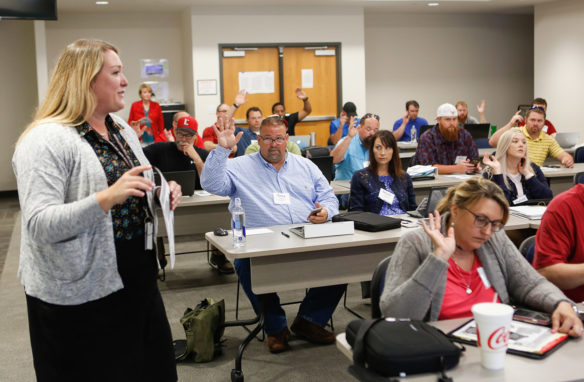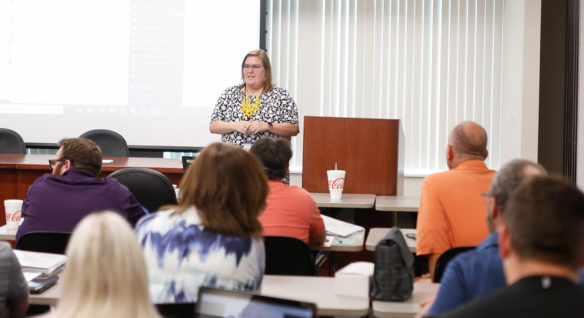
Tony Rutledge, center, a construction teacher at Henderson County High School, raises his hand along with others in response to a question by Brittney Howell, director of district student services for Frankfort Independent schools, at a New Teacher Institute training session on diverse learners at the Kentucky Department of Education offices in Frankfort. The New Teacher Institute helps occupation-based career and technical education teachers transition to the classroom and obtain certification.
Photo by Mike Marsee, June 10, 2019
- The 24-month program provides new CTE teachers with education, support and networking opportunities.
- The program has been around for almost 40 years, but was retooled by KDE about three years ago.
By Mike Marsee
mike.marsee@education.ky.gov
Tony Rutledge is finally where he always intended to be.
After some 30 years in other careers, Rutledge entered the classroom last year as a construction teacher at Henderson County High School. A few months later, he entered the Kentucky Department of Education’s (KDE) New Teacher Institute (NTI), a program designed to help new teachers obtain occupation-based certification.
Rutledge is halfway through the 24-month program, and he said the things he has learned and the people he has met have helped him become a better teacher.
“NTI has been awesome,” Rutledge said. “I would highly recommend it to any new teacher. It’s a huge asset.”
The New Teacher Institute smooths an alternative route to certification for career and technical education (CTE) teachers. Candidates who have a degree in the occupation area for which they are seeking certification will be recommended for licensure after completing the program. For those who do not have at least an associate degree, the institute partners with four universities and the Kentucky Community and Technical College System to find the right degree for each teacher.
The program provided an ideal avenue to certification for Rutledge, who went to college with the intention of getting a degree in industrial education with a minor in construction. A football injury put him on a different path that led to careers as a cheerleading coach, a project manager and dean of students at the high school where he switched to teaching construction after his predecessor retired.
“I’m finally fulfilling what I was intended to do from the very beginning,” he said.
The New Teacher Institute gives teachers what they need to know about how to function well in the classroom so they can help start students on their way to careers in a field where they will be needed.
“Secondary educators can start a pipeline,” the institute’s Director Jodi Adams said. “For example, we have a shortage of nurses in Kentucky and around the country, mainly due to a shortage of nursing faculty at the college level. Nurses can teach entry level courses to high schoolers in dual-credit courses. Those high schoolers can get the lower-level classes out of the way, and the college faculty can focus on the higher level courses needed to complete a registered nurse degree. Prepared nurses enter the workforce sooner with less debt. It’s a domino effect.”
The New Teacher Institute has existed in some form for almost 40 years. It was modeled after a highly effective military instructor training course that eventually was administered by five universities.
The program began to change five years ago when the Southern Regional Education Board conducted a study in Kentucky designed to induct teachers using the Teaching to Lead curriculum that remains a cornerstone of the New Teacher Institute.
“It gives teachers the skill set they need around classroom management, classroom assessment, instructional planning and instructional strategies, and it delivers it in a way where we model good classroom teaching,” said Debbie Anderson, an SREB program director who works with the New Teacher Institute cohorts. “We actually get them involved and use the strategies that we want them to use in the classroom.”

Jodi Adams, director of the Kentucky Department of Education’s New Teacher Institute, speaks to a cohort during a training session in Frankfort. Adams said the retention rate for teachers who complete the program is 92 percent.
Photo by Mike Marsee, June 10, 2019
Adams said 22 of the 25 prospective teachers who were part of that pilot are still teaching, which compared favorably to the 64 percent retention rate of the old model.
KDE sets the course of the program in partnership with the Education Professional Standards Board, and there have been some significant changes. For starters, the program was switched from 12 to 24 months, and the schedule was expanded from eight days of face-to-face meetings during one year to 18 days over two years. There are regional meetings as well as sessions for the entire cohort, with additional online delivery of some instruction.
There also has been more emphasis placed on student populations that have always been prevalent in CTE classrooms.
“The new model is heavily focused on providing the teachers with instructional strategies that benefit students with special needs, that benefit diverse populations, that benefit kids that love hands-on learning and aren’t wired for eight hours of sit-and-get,” Adams said.
The retention rate continues to be high – Adams said it’s at 92 percent – and the level of support for teachers has increased as well.
“Principals will tell you the stress levels of the new teachers are dramatically lower than what they had been in the past,” Adams said. “They felt like they were getting their feet under them much quicker, which impacts student achievement and student retention in our programs in a lot of different ways. You get a better teacher.”
The average age of New Teacher Institute participants is 45, meaning new teachers are coming to the program with a great deal of experience in their fields.
“Most of them have said, ‘I want to impact the next generation and build that pipeline,’” she said.
One such teacher is June McCreary, who just completed her first year as a health sciences instructor at Madison County Area Technology Center’s campus at Estill County High School. McCreary was a nurse or nursing administrator for 17 years and was enjoying her work before she was convinced to give teaching a try.
“I have absolutely loved it,” McCreary said. “I have not regretted it one day. I’ve always loved to educate. I used to do staff development and it’s important to me. I want people to choose health care and I want them to be good at it.”

June McCreary, a health sciences instructor at Madison County Area Technology Center’s campus at Estill County High School, laughs with fellow teachers at a New Teacher Institute training session at the Kentucky Association for Career and Technical Education’s summer conference in Louisville. McCreary said she and other health sciences teachers in her cohort have formed a network that has helped her during her first year in the classroom.
Photo by Mike Marsee, July 24, 2019
Teachers like McCreary and Rutledge are supported in the New Teacher Institute by a statewide network of 42 mentor coaches, who are retired CTE teachers and administrators who meet with, coach and observe them. Every participant also has a mentor teacher, a veteran CTE teacher of at least five years who is usually in their building.
In addition, teachers have formed friendships within their New Teacher Institute cohorts.
“There’s a group of us girls that are all in health sciences. Last year we were all first year and we all had a deer-in-the-headlights look, but it’s been fun,” McCreary said. “We have a group where we text or email if one of us gets stumped on a particular topic, and you can also see what they’re doing and what their school is doing. It’s been such a good way to keep us engaged, because you feel like you’ve got help.”
“We’re not alone,” Rutledge said. “I’ve got a network of people to talk to and go to. If I have any questions I can get those questions answered. There’s a whole bunch of us that have gotten really close. We enjoy bouncing ideas off of each other, and we enjoy sharing things that have happened in the classroom over the last year.”
Together with the curriculum, the support and the networking are designed to make teachers feel more at ease in their new classrooms.
“Student success starts with a well-prepared instructor, and we know how hard it is to find good CTE teachers. Once we find them, we want to be able to keep them,” Anderson said. “One of the major reasons that teachers say they leave the profession is because they feel isolated and they feel like they don’t have the support they need to be successful. This program helps to shore that up and to give them the kind of skill set that they need to walk in feeling confident.”
MORE INFO …
Jodi Adams jodi.adams@education.ky.gov
June McCreary june.mccreary@madison.kyschools.us
Tony Rutledge tony.rutledge@henderson.kyschools.us




Leave A Comment